For some, it is a question about whether Google serves “the same Web” for the millions of users who rely on Google as their principal portal. For others, it is a matter of relevance, and whether the infusion of data gleaned from the personal interests of one’s friends impedes the visibility of material those friends might never have seen. At any rate, Google’s swift response this week to negative reviews of its first trials of personally-adjusted search results, including Jon Mitchell’s fiery indictment, clearly demonstrate that it’s at least as sensitive as its own users.

It’s now extremely easy for any Google+ user to turn on and off personalized search results (called “Search + Your World”) at will, with a toggle switch in the upper right corner, part of Google’s rollout of changes today. Now, as a follow-up to our first tests of personalized search prior to the rollout, RWW looks into whether leaving the feature turned on necessarily improves the relevance of search results in various categories. At issue: Does Google elevate links to discussions about what you’re looking for on its own services, above what you’re looking for?
For this test, we’ll be using two different Google+ accounts, both representing legitimate (i.e., non-fake) people: myself and my wife Jennifer (the “gen” in “Ingenus,” which is our company). These will be the Type 1 accounts, for purposes of brevity. We’ll also be using a Type 2 Google account that is not signed up with Google+, and a Type 3 Google user who is not signed into an account at all.
There are some unique characteristics to take into account here: Jennifer is a long-time Facebook member; I am not. I am a Google+ member since its testing days; Jennifer is a recent inductee. I am a Twitter member; Jennifer is not. Both of us are LinkedIn members. These facts are important because neither Facebook nor Twitter allow Google’s bots to crawl their members’ contents, in order to ensure that content first posted to either source is seen there first.
However, Google+ enables activities from other social networks to be “connected,” which makes them visible to Google in a second-hand way. With a huge chunk of Web content being now being generated by Facebook and Twitter, it must be aggravating for Google to be stuck, for once, behind a pair of Great Walls. Linking already connected social net activities to search may give Google at least a periscope of sorts to peek into these forbidden worlds.
We’ll start by having my wife and I search for something we’re mutually interested in: this year’s IndyCar race schedule. On two separate systems within a few seconds of one another, searches on our respective Type 1 accounts for IndyCar 2012 schedule turned up identical results, with a recent AutoWeek article rated #1 and a link to IndyCar.com itself rated #3. However, a search on an unattributed Type 3 account placed the link to Wikipedia #7, instead of #8 for both of us humans. I don’t believe Google+ could possibly have ascertained our relative use of Wikipedia, so this very minor alteration could be purely coincidental.
IndyCar racing is a topic that Jen and I share, but frankly not so much outside our own families (only a very few of whom appear on Google+). That’s why I chose this search first: It’s something that’s least likely to be affected by our social net activity.
So next, let’s try a complex search that moves to the opposite side of the spectrum: “Web app” development platform. Both of us should have some activity in this department, though I cover this topic as a daily correspondent. First, the Type 3 search:
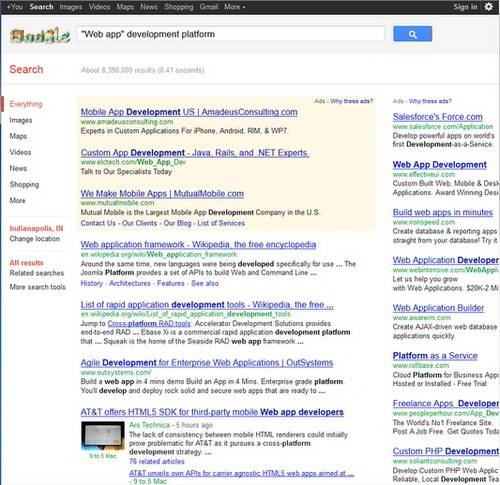
Never mind the sponsored links, which are subject to different factors. Below those, Wikipedia entries rank #1 and #2, which is common for Wikipedia. A link to a company called OutSystems, which makes a Web apps development toolkit called Agile Platform, ranks #3. And a 2007 ReadWriteWeb story on Bungee Labs ranks #5. This same search tried with a Type 2 account yielded exactly the same results.
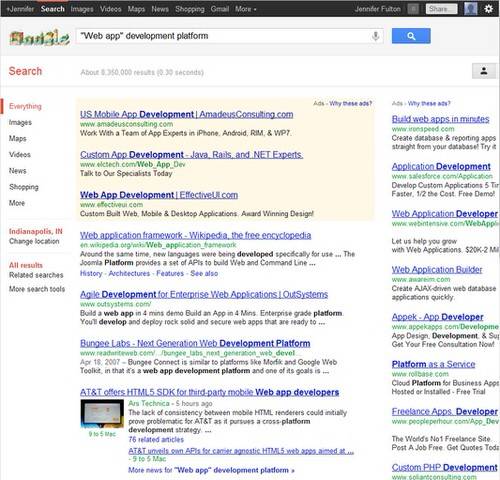
When this same search is tried with Jennifer’s Type 1 account, there’s only one Wikipedia entry at the top. The OutSystems link has been elevated to #2, and the RWW story on Bungee Labs is bumped up to #3. Is this really by virtue of Jen’s association with me, and my association with RWW?
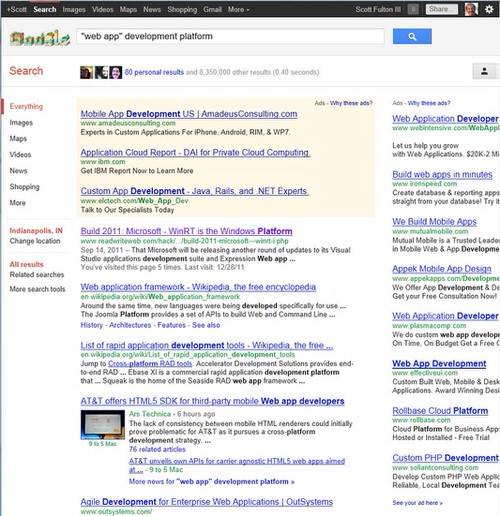
It’s looking quite likely. For Scott’s Type 1, a link to one of my own stories appears first. That’s a personalization that Google has made before, however, letting search results point to pages frequently visited. (I’ve had to find my own articles through Google any number of times to create valid hyperlinks to them for later stories. No, I’m not that vein that I search myself in my spare time.) So maybe RWW wasn’t placed first for reasons pertaining to my Google+ activity. If we make one small adjustment to the search criteria, removing the quotation marks from web app, we might discover something:
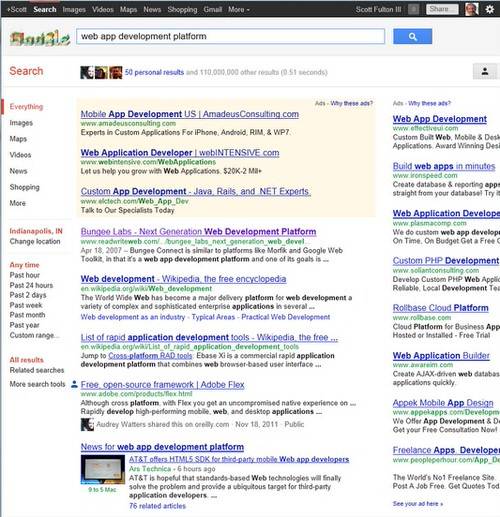
Bingo. A ReadWriteWeb story produced four years before I came on board, which didn’t even show up for the Type 3 search, and which isn’t even the subject of a shared link by a Google+ member, now ranks #1 on Scott’s Google+ account.
Notice that with this latest rollout, entries to links that were directly provided by someone who’s in my Google+ circles (in this case, journalist Audrey Watters, who has been an RWW contributor) are clearly marked with little “pawn” icons. These are links that are added to the mix, things that Google may not have directly crawled. But it’s obvious this isn’t the only change that “Your World” makes to search results.
It is very clear from this test that items to which a member of one’s Google+ circles may be associated, have a direct impact on that member’s search results. The indirect impact is major, effectively taking an entry that might otherwise have been completely invisible and making it #1.
Could these changes actually be improvements, especially if they weren’t links to things that the user may have just happened to publish on a global scale? It turns out that searches on all our accounts for topics other than stuff you’d find in “tech news” but that Jennifer and I have both expressed interests in at one time or another (musical tastes, artistic techniques, science fiction, science fact, movies I know folks in my circles have definitely seen and commented about, political events) have only marginally shuffled, if not identical, search results for an unattributed account as for one that’s signed in to Google+.
I have quite a few people in my Google+ circles now, but if none of them have made mention of, say, Maureen Dowd’s fabulous characterization of Mitt Romney in this morning’s New York Times, then it’s not going to get much of a bounce in my Type 1 search results.
There’s also this observation: Just since last week, when links to Google+ posts that link to articles appeared to replace the articles themselves, there has been a few significant adjustments. First, just because someone in one’s Google+ circles makes one recommendation does not mean it gets stamped into the middle of search results. Instead, Google now creates a row that shows circles members’ faces. Clicking on See all results next to those faces brings up a Google+ page showing their social net posts and recommendations. This is far preferable to having those posts supplant the actual items to which they refer.
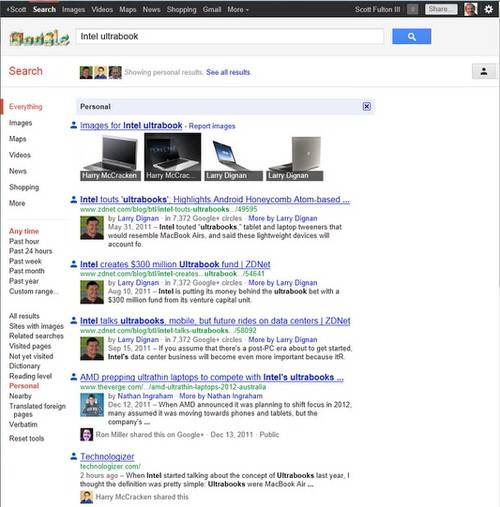
Second, links that do appear in search results and are marked with the “pawn” icon represent the original article as authored by the person who appears in circles. Unfortunately for now, Google+ makes this association by linking the author’s byline with his Gmail account, which is something not every author does or wants to do. Third, when the number of personal results dwarfs those from regular search, as is the case with the search for Intel ultrabook above indicates, Google creates a row marked “Personal” with an “X” button that lets you close it and see the regular results.
These are all improvements, letting the changes that Google+ does make to search results be offered as enhancements, unless the user does not perceive them as such. Presented like this, these changes do not unwire the Web, even for people who rely solely upon Google as the vehicle that delivers the Web to them every day. For now, however, we’ll continue our tests to see what impact these changes, enhancements or not, may have upon the subtle, and often fragile, art of SEO.






